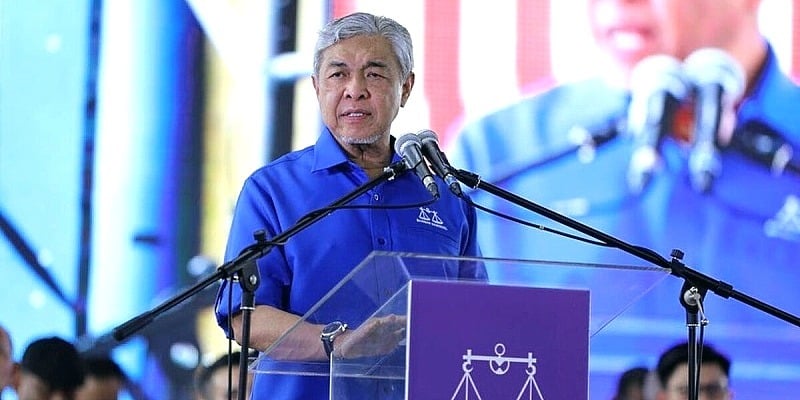Disappointingly, UEC recognition remains very much a taboo in Malaysian politics, while long-term (5-year) development goals are hardly touched on.
BN finally unveiled its manifesto for the 15th general election on Tuesday, with ten priorities and 99 initiatives that cover a very broad spectrum.
But unlike the manifestos released earlier by Pakatan Harapan and Perikatan Nasional that expressly prioritize the battling of corruption, anti-corruption agenda has never actually made it into BN’s election manifesto, promising instead to set up a special parliamentary committee on the appointment of key public offices and more power for anti-corruption agency.
And there is no mention at all of UEC recognition which the local Chinese community is concerned about. By comparison, at least PH has promised to “continue to work hard to fight for the recognition of UEC.”
We would like to discuss some of the key points among the 99 initiatives in BN’s election manifesto, also known as Padu (Perancangan Amal dan Usaha BN).
1. Poverty elimination and assistance for households earning under RM2,208 a month comprising about 5.6% of the country’s total population.
Helping impoverished families is commendable, but the question is, should we keep providing monetary handouts to these families? Perhaps the government should strive to improve the quality of the people as a more practical means to help deliver them out of the scourge of poverty.
2. Even though the BN has not mentioned fighting corruption and abuse of power in its manifesto, it has promised to set up a special parliamentary committee responsible for the appointment of key positions such as the MACC commissioner, election commission chairman and Bank Negara governor, in a bid to uphold the spirit of rule of law and curtail any conflict of interests.
BN has also pledged to set up an integrity commission as a watchdog agency to oversee the conduct of public institutions. This should help fulfill the government’s objective of battling corruption.
3. BN has set its sight on healthcare at 5% of the country’s GDP by 2027 to the tune of RM77 billion (the allocation should be increased to RM90 billion by then, based on 5% annual expansion in GDP), building more specialist hospitals and increasing the number of specialist doctors. The country is currently suffering a severe shortage of government specialist hospitals and specialist doctors.

4. As the BN manifesto has not mentioned the recognition of UEC, this issue will remain unresolved if BN were to helm the federal administration again.
Nevertheless, the manifesto has mentioned about free pre-school education for children under the age of six as well as nurseries. In the meantime, children from B40 families will be entitled to free tertiary education while those from M40 families can gain access to 100% full study loans.
Additionally, “gap year” education programs will also be introduced to allow students to pursue their interests.
Unfortunately, among the 17 education-related initiatives, none has touched on the right to education for special needs community such as people with disabilities, mentally challenged individuals as well as autistic children. In view of this, it is essential for all contesting political parties to consider the need for training special education teachers and the establishment of “special education classes” at medium-sized schools.
5. BN’s manifesto appears to prioritize the youth much more than the elderly. For instance, BN will set up motor racing circuits in states across the country and set aside RM20 million a year to host racing events (what about venue maintenance?). This proposal is tailored to woo the young road racers. By comparison, only RM105 million will be allocated over five years for old folks’ homes and centers for the handicapped.
Also, there are currently 6.1 million EPF contributors whose savings are below RM10,000, meaning 73% of EPF members will not have sufficient old age savings for their future retirements.
6. As a consequence of war and climate change, food crisis will become an imminent reality. BN should be commended for incorporating agricultural personnel training and promotion of fishery and aquaculture in its administrative policy. That said, a more pragmatic approach will be soil improvement and the introduction of high quality crop varieties and production techniques.
Take the rice production for instance, our yield is only 3.2 tons per hectare per year, far below those of China, Taiwan and Australia at 5.5, 6.5 and about 10 tons respectively. If we are unable to boost the yield, we won’t be able to woo talented young people to venture into this business. It is therefore essential to introduce good quality crop varieties and production techniques as well as improve the production and quality of crops, in order to address the bottleneck in the development of the country’s agricultural sector.
7. BN has pledged to severely punish individuals or companies destroying the ecological environment, enhance the use of energy-efficient vehicles, expand the forest coverage from 59.5% now to over 60%, preserve the equilibrium of natural ecosystem and reduce carbon emissions. All these are common duties of global communities in containing the hazards of climate change.
Besides BN, we hope that other political camps will also promote environment preservation if they get to helm the federal government after GE15.
All the three major political camps have put forward their respective manifestos. Reassuringly, they have either directly or indirectly expressed their resolve to weed out corruption.
But disappointingly, UEC recognition remains very much a taboo in Malaysian politics, while long-term (5-year) development goals have hardly been touched on, including flood mitigation program, KL-Singapore high speed rail project, and boosting the GDP to US$510 billion (equivalent to US$15,000 per capita to qualify as a high-income country).
Apparently, there is still plenty of work to do for the new government!
ADVERTISEMENT
ADVERTISEMENT








































